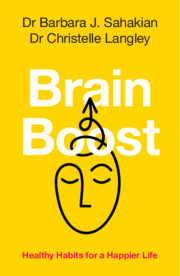Book contents
- Reviews
- Brain Boost
- Brain Boost
- Copyright page
- Dedication
- Contents
- Foreword
- Introduction
- 1 The Importance of Exercise
- 2 Eating for Health and Wellbeing
- 3 Why Do We Need Sleep?
- 4 Why Is Social Interaction So Important?
- 5 Social Kindness and Helping Others
- 6 Mindfulness and Enjoying the Moment
- 7 Keeping Your Brain Fit through Learning
- 8 Don’ts: What Not to Do
- 9 Experience the Benefits of Work
- 10 Now It’s Your Time to Boost Your Brain
- Acknowledgements
- References
- Index
2 - Eating for Health and Wellbeing
Published online by Cambridge University Press: 23 January 2025
- Reviews
- Brain Boost
- Brain Boost
- Copyright page
- Dedication
- Contents
- Foreword
- Introduction
- 1 The Importance of Exercise
- 2 Eating for Health and Wellbeing
- 3 Why Do We Need Sleep?
- 4 Why Is Social Interaction So Important?
- 5 Social Kindness and Helping Others
- 6 Mindfulness and Enjoying the Moment
- 7 Keeping Your Brain Fit through Learning
- 8 Don’ts: What Not to Do
- 9 Experience the Benefits of Work
- 10 Now It’s Your Time to Boost Your Brain
- Acknowledgements
- References
- Index
Summary
Having a healthy diet is essential for physical health, brain health, cognition, and overall wellbeing regardless of age. A balanced diet, rich in fruits, vegetables, lean proteins, whole grains, and healthy fats, provides vital nutrients for optimal bodily functions and supports mental and emotional wellness. Obesity and Type 2 diabetes are prevalent, with obesity rates tripling since 1975 according to the World Health Organization (WHO). These conditions underscore the importance of healthy eating habits and maintaining an optimal body mass index (BMI). Understanding dietary components such as carbohydrates, proteins, and fats is crucial for making informed food choices. The Mediterranean and MIND diets exemplify healthy eating patterns linked to reduced disease risks and improved mental health. Moreover, dietary factors influence brain health and cognition through mechanisms like inflammation modulation and the gut–brain axis. Adopting and maintaining a healthy diet throughout life promotes longevity, energy, and overall fulfilment, making it a cornerstone of a vibrant lifestyle.
- Type
- Chapter
- Information
- Brain BoostHealthy Habits for a Happier Life, pp. 23 - 35Publisher: Cambridge University PressPrint publication year: 2025

